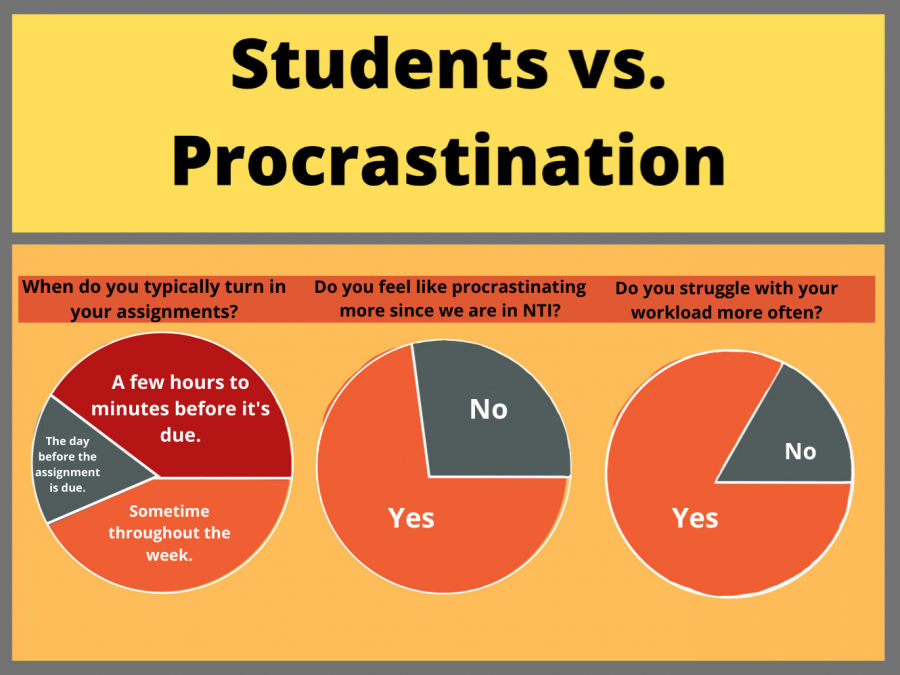OPINION: Procrastination culture needs to stop
RedEye conducted a poll of the Manual student body to find out how they handle the school workload and temptation to procrastinate. Graphic by Ofelia Mattingly.
February 25, 2021
Have you ever had an assignment due in two weeks and thought, ‘Oh, I can do this tomorrow,’ but tomorrow comes and you say the same thing. Then the next day you tell yourself the same thing and again the next day and before you know the cycle keeps repeating until the day before the assignment is due?
We’ve all experienced procrastination at some point in our lives and it can be healthy in moderation. The issue is, too many students are constantly stuck in this cycle and it’s not an ‘every once in a while’ experience. Getting caught in a perpetual loop of procrastination is part of the reason students get overwhelmed with tasks they are assigned to do at home or at school.
According to a study conducted by StudyMode, 87% of high school and college students procrastinate and 45% of the students say that procrastination leads to negative impacts on their grades. Students may also develop mental health issues as a result of intense procrastination.
If we know it’s bad for us, why do we still do it? There are many various contributing factors that lead students to rely on procrastination and repeatedly fall back on this method. Recognizing them can help in creating preventative measures or helpful strategies.
Motivation
One cause of procrastination is simply a lack of motivation. Some people find that motivation for even the most tedious tasks comes naturally, but there are others who struggle in the search.
Lack of motivation may arise for many different reasons. Students may feel that the task doesn’t contribute to any future goals they have or that the topic sparks absolutely no interest for them. Additionally, laziness can contribute to a lack of motivation, as some students just don’t feel like putting in effort to do the task.
“It’s been really hard to stay motivated during COVID because there is just so much going on in the world and after sitting in Zoom classes all day, it’s difficult to have the motivation to do other things,” Evie Reed (11, J&C) said, “It’s also been a challenge to do things around the house that need to be done because I spend most of my day working on school work.”
Feeling Overwhelmed
Procrastination can also stem from feeling overwhelmed. Having multiple assignments due at or around the same time can result in some students pushing something aside because they don’t know where to start. Oftentimes this leads to avoiding the task altogether or realizing last minute that something is due and finishing it in a panicky rush. Having too many assignments can also lead to a person averting a task because it may be frustrating, tedious or just boring to deal with.
“Given the circumstances of the pandemic, there’s a lot behind the scenes of many student lives. While there are some circumstances that we almost absolutely have to tell our teachers about (ex: sickness), other situations (such as emotional stress and mental health) can easily be hidden behind our screens and faces,” Kaylynn Li (11, MST) said, “We do have mental health counseling for those related issues, but some students may prefer other options on their own to destress and take care of themselves.”
Fearing Imperfection
For some, the fear of failure or making a mistake leads to procrastination. Not wanting to do poorly on something or lacking self-confidence or worth can lead students to putting off an assignment. Some students feel the pressure of perfectionism bearing down, leading anxiety or stress to surround these tasks.
It can be difficult to prevent the fear of not being good enough from overriding. However, this fear can lead to procrastination, which leads to the issue not being properly addressed and thus snowballing into an even bigger dilemma.
What can we do?
Procrastination is a struggle we know plagues many students; fortunately, there are ways to avoid going down that route and to get removed from the cycle.
One way schools can be proactive and help students is to reduce the amount of homework and workload administered. One of our previous articles, Too much homework is damaging to students, further outlines this argument.
“I think the workload during in person school is reasonable,” Reed said, “But right now we are in the middle of a pandemic and I shouldn’t spend most of my time stressing about school work because there is a lot happening for everyone.”
“Students need time to learn practical knowledge and engage in activities to strengthen social, emotional, mental, and physical health as well as educational curriculum,” Keeley James (11, MST) said.
“Lifting off some homework load for those students may give them more time to care for their needs in the way they prefer to do so,” Li said.
Teachers can help by continuing to be a support system. Knowing some of your students’ goals can allow you to apply some of their interests to your teachings and homework, which in turn will make the student want to pursue the assignment more. Having a solid communication system with your students is also helpful for both parties and can lead to improved relations and reduced stress.
Finally, students themselves need to take initiative. One option students can take to avoid procrastinating on their assignments is to make a to-do list. A daily to-do list allows you to jot down what assignments and chores you will do each day and can make everything you have to do a little less overwhelming. Setting yourself deadlines and ensuring you stick to them is another good way to hinder procrastination, since it motivates you to get that assignment done that day. Don’t allow yourself to let the work pile up and try to remind yourself of the benefits and accomplishment of getting something done.
Liv Ashley (9, YPAS) suggests that putting your phone in a different room is another useful strategy to prevent procrastination.
Communication, as always, is key. Be open with your teachers and don’t be afraid to reach out or ask questions. Make yourself be present and engaged in the material. Gaining a better understanding of the assignment will allow you to feel better about what you are doing in that class. If you feel a topic for a paper or project no longer interests you, ask to switch it before it’s too late. Tell someone how you feel or have a friend help keep you accountable when it comes to completing classwork. Find clarity in communication and go into assignments with confidence, not frustration or overwhelming stress.
Remember that hard work deserves a reward. Knowing there is a reward after the finish line can seriously help boost motivation, not to mention make you feel good about all you’ve accomplished. It’s useful to look to the positivity, whether that be the simple satisfaction of getting the task done or setting aside some quality downtime after the day’s work.
Procrastination is an issue we need to take seriously and stop accepting as normality. It’s only making students more prone to negative mental health consequences and creating a bad habit. Schools and teachers can help guide and aide in this process but it’s up to us students to take initiative and make the change within ourselves.


















